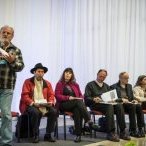English · Español

7 de julio de 2015 | Videos | Encuentro Mundial de Movimientos Populares 2015 | Soberanía Alimentaria
Panel on Land focuses on fight against agribusiness and the struggles around land and food
Descargar: MP3 (3.3 MB)
The first panel of the World Meeting of Social Movements focused on the issue of land. João Pedro Stédile of the Landless Rural Workers Movement (MST) of Brazil, Silvia Ribeiro of the ETC Group and Rodolfo Machaca of the Peasant Workers Union Confederation of Bolivia were in charge of the analyses and reflections shared by the movements.
One of the first issues identified by Stédile during his presentation was the growing concentration of capital, a process where financial capital becomes more and more present. "No more than 300 transnational companies combined with banks concentrate 58% of the global production. However, they provide job sources for only 8% of workers and no more than 50 transnational companies control the majority of agricultural production in the world”.
These companies, said the MST leader, are not only making decisions about food production in the world, but have promoted an "international division of agricultural production in the past twenty years. This is the territory of soy. Who decided that Argentina, Paraguay, Brazil and Santa Cruz were to grow soy? The governments? No, it was Monsanto, Syngenta... They decide which country will produce what".
The decisions have meant a reduction in the variety of food available in all regions: "We used to have a large diversity of food, now five supermarket chains are selling less products, they are the ones who impose the prices they want".
At the end of his presentation, Stédile said: "We need a peoples´ plan and need to fight for changes not only related to agriculture. In addition, now we have to reorganize agriculture so that we can go back to consume many different kinds of products which are healthy, without poisons. We need to struggle for an agriculture not only for and by the countryside, but for all human beings".
Stop concentration and destruction
Meanwhile, Silvia Ribeiro highlighted the responsibilities in the environmental and territorial crises: "It took millions of years for life to develop on Earth, and the fact that a market system managed to destabilize climate in less than 50 years is a tragedy. There is a minority which is most responsible for this".
This responsibility belongs to the largest corporations in the world, according to the environmental activist: "There are 12 biggest companies in the planet: The supermarket chain Walmart, nine companies from the oil, energy and mining sector and two automobile corporations". She also shared figures about concentration and displacements: she said that 80% of the world population holds only 5% of wealth.
About the differences between agribusiness and traditional, small-scale production models, Ribeiro said that the "agroindustrial food/agricultural system is the one that emits the most climate change-inducing gases. The agroindustrial system only feeds 30% of the population in the world, while the peasant food system provides food for 70% of human beings".
Continuing with her analysis about the role of agribusiness, Silvia said: "30 years ago there were over 7 thousand seed companies at world level, and no seed was patented. Today, over 85% of seeds sold are registered".
One of the consequences of this is: "To plant, gather the seed and plant it again is now a crime, because the business is to sell poison". A poison that has increased the incidence of cancer in areas where soy is cultivated by approximately 1000%. "We need to reject any version of GM products and fight to keep agriculture decentralized", she concluded.
Imagen: Lidyane Ponciano








